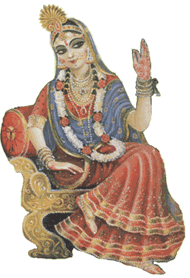 |

|
|
HINDU GODS / DEITIES
Devotion to God and the Gods of
Hinduism is known as Bhakti. It is an
entire realm of knowledge and practice
unto itself, ranging from the childlike
wonder of the unknown and the mysterious
to the deep reverence which comes with
understanding of esoteric inter-workings
of the three worlds.
Hinduism views existence as composed of three worlds. The
First World is the physical universe; the Second World is
the subtle astral or mental plane of existence in which the
devas, angels and spirits live; and the Third World is the
spiritual universe of the Mahadevas, "great shining beings,"
our Hindu Gods. Hinduism is the harmonious working together
of these three worlds.
According to Hinduism, all gods are
the various representation of one true
God. Hinduism states that there is only
one God and the Vedas call him
Brahman. The vibratory aspect of
Brahman is called Aum or Om.
From Aum came the three most important
Hindu gods (or Trimurti);
Brahma (the creator), Vishnu
(the preserver) and Shiva (the
destroyer).
The gods of the Hindu faith
represent different forms of Brahman. These gods are sent to
help people find the universal God (Brahman). In Hinduism
the Supreme Being doesn't sit in Heaven meting out rewards
and punishments, but, instead, is present in all creatures.
Rather than being a pantheistic religion, Hinduism is
panentheistic -- because god, as an ever-changing Being, is
present in everything. |

WORLD RELIGIONS
COMPARED
WORLD
RELIGIONS CLIPART
WORLD
RELIGIONS HOME
HINDUISM HOME |
Most Hindus have a personal god or goddess such as Shiva,
Krishna or Lakshmi to whom they pray
regularly. Most Hindus believe in an immense unifying force
that governs all existence and cannot be completely known by
humanity. Individual gods and goddesses are personifications
of this cosmic force. In practice, each Hindu worships those
few deities that he or she believes directly influence his
or her life. By selecting one or more of these deities to
worship, and by conducting the rituals designed to
facilitate contact with them, a Hindu devotee is striving to
experience his or her unity with that cosmic force.
The Hindu system of theology is founded on the
Vedas but the whole structure is a lot more complicated than
your normal "God" structure:
 |
TRIMURTI (TRINITY): Brahman is considered by Hindus as the cause and
foundation of all existence and is the one and only true
God, however a triad of Gods called Trimuti are considered the
three highest manifestations of the one ultimate reality.
|
 |
GODDESS
TRINITY: The wives of the three main gods of course!
Many goddesses were portrayed as wives, and it is
significant that ancient gods usually had consorts. It
was considered that the union of the masculine and
feminine was necessary to represent the fullness of the
Godhead.
|
 |
TEN AVATARS OF
VISHNU: Lord Vishnu's preserving, protecting powers
have been manifested to the world in a variety of forms,
called Avatars, in which one or more of his divine
attributes were embodied in the shape of a human being
or an animal or a human-animal combined form, possessing
great and sometimes supernatural powers.
|
 |
MOTHER GODDESSES (DEVI /
SHAKTI): Devi is the "Mother Goddess," meaning she
is the mother of all. Her name means goddess, and she
has many forms or incarnations. Her most familiar forms
are ferocious, such as Durga and Kali, or benevolent,
such as Parvati.
|
 |
PANTHEON OF GODS:
The Hindu Pantheon of Gods is vast, but in fact, Hindus
are a monotheistic religion worshipping only one God;
Brahman. All the other gods serve as a way in which
devotees can see, touch and feel this unknowable God,
Brahman. They give the layperson a tangible, knowable
aspect of the Supreme Being. Each of the Hindu Gods
represents one aspect of Brahman. Shiva takes on the
destructive aspect of Brahman. Vishnu preserves the
working order of the universe. Each Hindu God is one
tiny aspect of the Supreme Being.
|
Lead us to a free world,
Wise One,
where lie divine luster, sunlight, and security.
Valiant are the arms of thee, the Powerful;
we will take to their vast shelter.
Atharva Veda 19.15.1-4

| |
 |
 |

